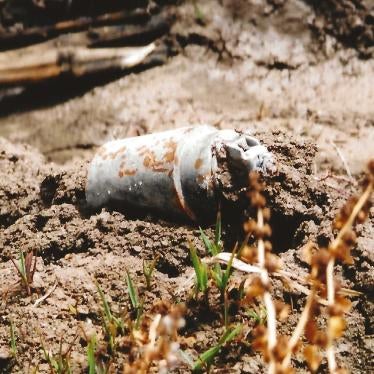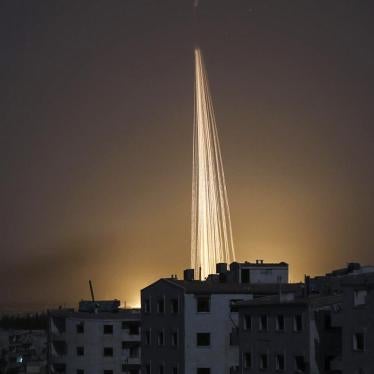Dublin, Ireland
This convention is a gift to the world. The real beneficiaries are the thousands of civilians who will not lose their lives or limbs to cluster munitions—cluster munitions that will never be produced and never be used.
This is an all too rare example of governments responding to the call of civil society—a call to deal urgently and comprehensively with a humanitarian imperative.
It shows that humanity has the power to move mountains—the power not only to move mountains, but even the United Kingdom, Germany, France and Japan. [general laughter]
The convention is a milestone in the development of international humanitarian law, and in the concept that the protection of civilians must be given the highest priority, both during and after armed conflict.
A key aspect of this convention is prevention. We are finding a cure, not just treating the symptoms. There are billions of submunitions in existing stocks which must never be used, never be shipped to others for use. This convention has in essence stopped a man-made disaster in waiting.
And, as so many others have noted, it has only been possible because of the partnership and close cooperation among governments, the Cluster Munition Coalition (CMC), the ICRC, and UN agencies, especially the UNDP. The nature of the process itself may be as important as the treaty. Like the Ottawa Process on landmines, it shows that there can be a new kind of diplomacy, not dominated or dictated by so-called superpowers, but driven by the need to meet basic human needs and respect basic human rights and international law, and the willingness to engage in creative responses to humanitarian problems.
And indeed humanitarian interests have prevailed in this convention, without question. It is a convention not just for the survivors, but also because of the survivors. They have been incredibly effective advocates, reminding delegates on a daily basis of the reason they have been here negotiating, but also pushing for specific language and approaches to key issues.
The treaty text exceeds most all expectations. It is a comprehensive ban on all cluster munitions in all circumstances; it bans every existing cluster mention that has ever been used. There are excellent provisions on victim assistance and clearance of contaminated areas. What did not get added to the treaty in the past two weeks is just as important as what is there: there are no exceptions for specific cluster munitions in the arsenals of certain countries. There is no transition period that would allow the use of banned weapons for a number of years.
The treaty is not perfect. It could not be, given the diverse interests of more than 100 nations. We are especially displeased with Article 21 on interoperability, which is too vague and unclear, and seems politically motivated, not humanitarian driven. We will work hard to make sure governments interpret this provision in the correct manner, and more generally, to improve the treaty through the implementation process.
Let me anticipate a question that you might ask about my own country, the United States. In our view, the United States placed unwarranted and unwelcome pressure on many states here in Dublin, and for many months beforehand. But in the end, the bottom line is that the US’s closest allies decided to ban a weapon that the US holds in staggering quantities—with some one billion submunitions in the US arsenal. The majority of the world’s nations—including a majority of past users, producers and stockpilers—have sent a strong message to the US: never again use these indiscriminate and barbaric weapons. We still are hopeful that the US will see the light and join its allies in supporting this treaty; it is political will that has been lacking.
In closing, let me emphasize that the job is not done, it is just beginning. The hard part is not getting a treaty agreed to (though at the moment, President O’Ceallaigh may disagree), it is getting it fully implemented and respected. We have daunting work ahead to maximize the number of signatories in December, to get 30 ratifications as soon as possible to ensure early entry into force, to universalize the convention, to promote effective implementation, and to monitor compliance.
This future work can also only be done effectively through the partnership that has brought us to where we are today, and we look forward to working together to make the beautiful words on paper into reality.
Other Participants: Irish Foreign Minister Micheal Martin; Norwegian Deputy Minister of Defense Espen Barth Eide; Sara Sekkenes of the UN Development Programme; Peter Herby of the International Committee of the Red Cross.







